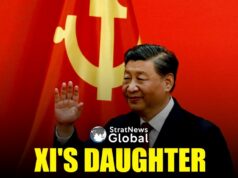Xinjiang Cotton Ban War
China is claiming victory against one of the multinationals that had announced a boycott of Xinjiang cotton last year. China’s state-run television channel CGTN reported that the Better Cotton Initiative (BCI) had announced the ban last year, which resulted in Xinjiang cotton products being blacklisted. But now it appears BCI has quietly removed the ban announcement from its website.
BCI is a Swiss-based NGO established in 2009. It has nearly 2,000 global members, many of which are world-class well-known apparel brands and its certification or lack of it can affect sales drastically. Chinese media has claimed the reported removal of the statement has shown that Western multinationals have bowed to the boycott of their goods by the Chinese people Since then, they claiy that the stock prices of Nike and other brands have plummeted. In just one day on March 25, the market value of Nike and Adi “evaporated” by 73.3 billion yuan.
Source: Xinhua & Agencies
West’s ‘Colour Revolution’
China’s national security agency recently stated that an increasing number of cases threatening the country’s “political security” have come to light in recent times. The agency claims that many of the cases which focus on the ongoing “turmoil” in Hong Kong since 2019 are using the term “colour revolution” to bring about change. Chinese authorities term the colour revolution as a “smarter measure” by Western countries to destabilise or overthrow a country. “After the Iraq War, the US and its allies have been more reluctant to dispatch ground troops because direct military operation will cause casualties to their soldiers and other unpredictable costs. But using social media networks, NGOs, and ‘diplomats’ to mobilize, train, fund and organise local people against the government will cost less and is easier to create chaos,” Li Wei, an expert on national security and anti-terrorism at the China Institute of Contemporary International Relations, told the Global Times.
Li also claims that Western journalists are playing a key role in the “colour revolution” In cooking-up rumors about “genocide” and “forced labour” in Xinjiang, Western media are playing an important role he noted. “Certain ‘journalists are receiving funding and training in other countries, and implementing tactics of anti-China politicians to destabilise China.”
Source: Global Times
AI Aiding Fight Against COVID-19
Chinese media are claiming that the government is collaborating with Artificial Intelligence (AI) companies to help doctors and the public healthcare system deal with patients who have COVID-19. They say through new solutions powered by AI technology, problems can be spotted and solved earlier. From using satellite technology to track patients and affected areas, the Chinese government claims it is better able to monitor infected patients and patterns, thus enabling them to create makeshift hospitals accordingly. But satellite technology is only the beginning. AI solutions at building entrances and public spaces can help support staff to detect individuals with fever faster.
AI however doesn’t stop with “intelligence temperature measurement.” Tian Feng, dean of SenseTime Intelligence Industry Research Institution, an AI firm working closely with government said, “AI has been fully applied in the entire process of epidemic control and prevention, from intelligent temperature measurement, research and development on drugs and vaccines, to AI diagnosis, data analysis as well as intelligent robots. It can play a key role in diagnosis and classification of COVID-19 cases”
Source: CGTN
‘Ugly’ Buildings Banned
China does not like “ugly” buildings and it is official. In a notice published on Tuesday this week, the National Development and Reform Commission stated that the construction of “super high-rise buildings taller than 500 meters should be strictly limited” and the creating of “ugly buildings is prohibited.” The problem for developers is that the government body does not specify what it constitutes as an “ugly building”, but Weibo users do believe the focus is on China’s rapid urbanisation. #Ugly buildings has recently been trending as a hashtag garnering 170 million views with users sharing pictures of what they believe are ugly buildings. Many have focused on the Tianzi Hotel in the northern Hebei province. Dubbed the largest “image building” in the world, the 10-story hotel depicts images of Chinese gods Fu, Lu and Shou. The entrance to the hotel is through the entrance of the right foot of the left-most god, Shou.
Source: http://www.sixthtone.com/
Have An Exotic Name? Change It!
In the age of social media many millennial Chinese want to get more creative with their names, but the government won’t let them. Why? The problem is digitisation. The Chinese language has over 55,000 characters but in a bid to give Chinese digital national identity cards, the government programmed Chinese characters into computers in 2017. The problem: the computer could code only 32,000 Chinese characters leaving those with exotic names in trouble, so they are being advised to change them. For instance, Cheng is a rare Chinese character not recognised by the computer. Other problems are those who have adopted English initials. One student calling himself Zhao C has been told to change it.
Over 60 million Chinese citizens are having trouble when it comes to travel, ID checks, and insurance claims due to their names having unrecognisable characters. Many people have thus changed their names for the sake of convenience which in turn is pushing certain characters to the brink of extinction. Also, it can lead to mass confusion. The commonality of around 100 surnames means that a large number of Chinese are known by the same. Statistics shared in a report in the New York Times show that there are more than 92 million Wangs in China, followed by 91 million Lis and 86 million Zhangs and the number is growing.
Source: https://radiichina.com/
Ageing Population A Concern
China’s greying population has long been a concern for government officials and the problem is only getting worse. Ren Zeping, chief economist at property developer Evergrande Group, who has done extensive research on the issue, claims that the aging of China’s population is accelerating, and the speed is far surpassing Europe, America and Japan. It will enter a deeply aging society accounting for more than 14% in 2022, and a super-aging society accounting for more than 20% around 2033, and then continue to rapidly increase.
The ageing population will put intense pressure on the country’s pension and healthcare sector and experts warn action must be taken now. Measure such as encouraging couples to have more children through longer maternity breaks and tax breaks for children with parents, must be pushed forward. The government’s recent moves have however caused concern instead. Chinese Premier Li Keqiang’s statement to the National People’s Congress that China would raise the statutory retirement age “in a phased manner” will affect many elderly Chinese who will now have to wait longer for their pensions. Younger Chinese students are also not happy as this move could shrink the job market.
Source: sohu.com & Agencies
















